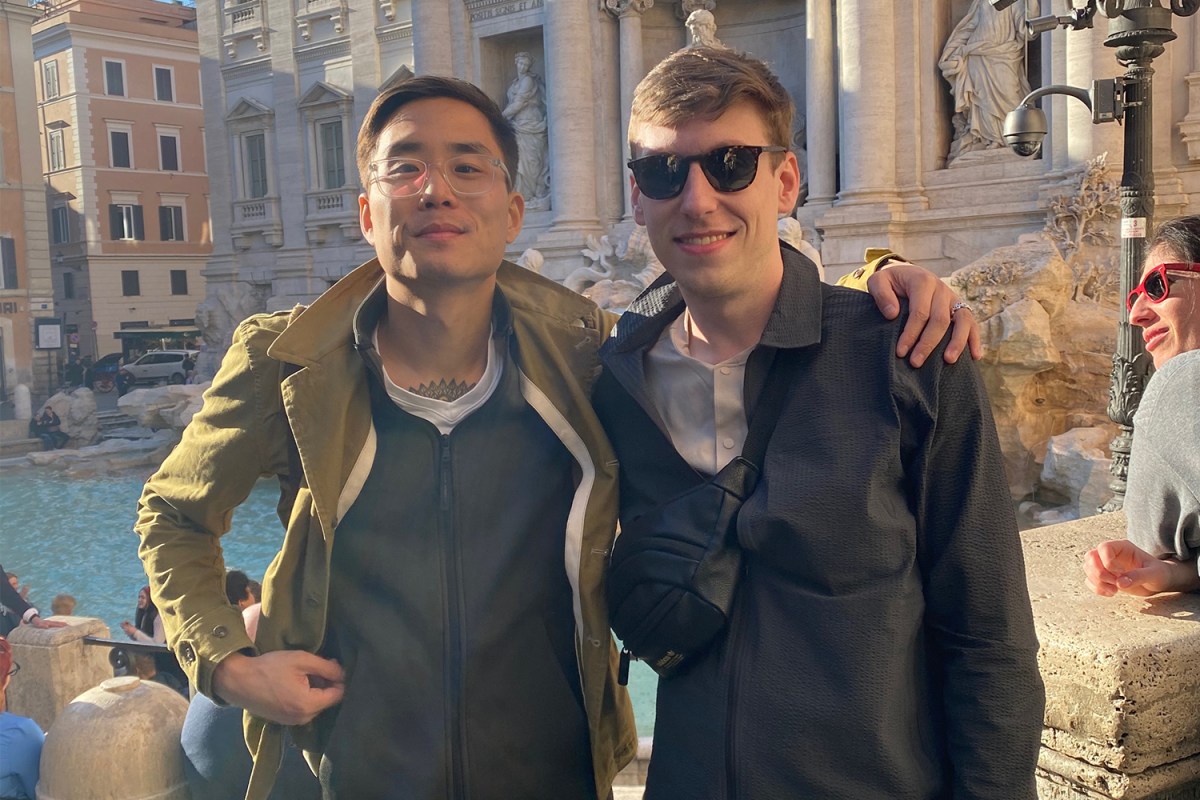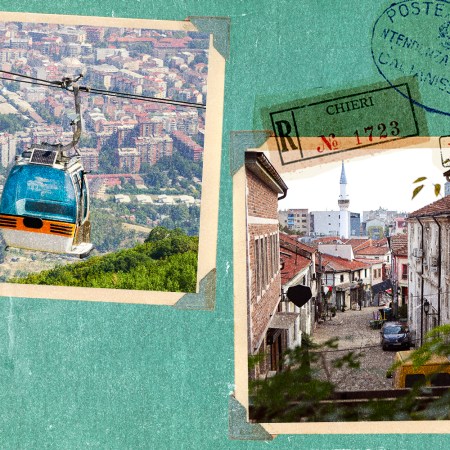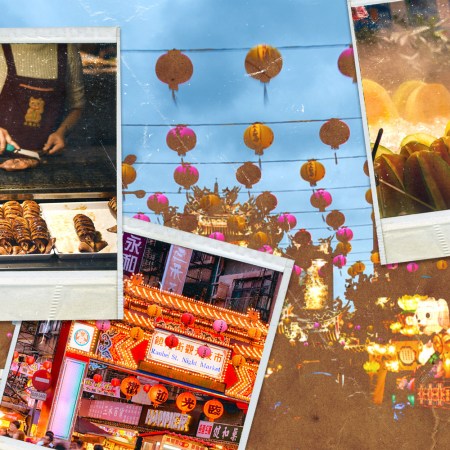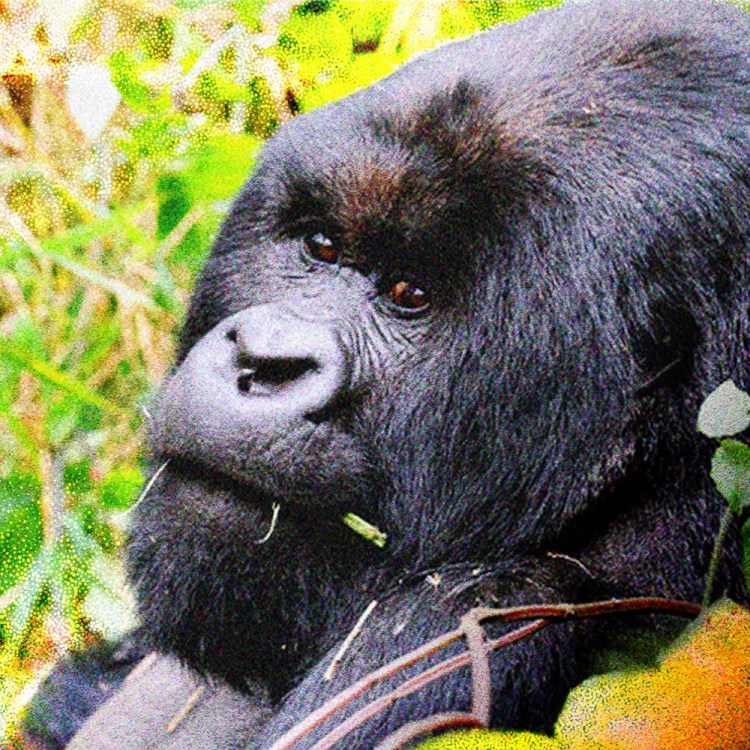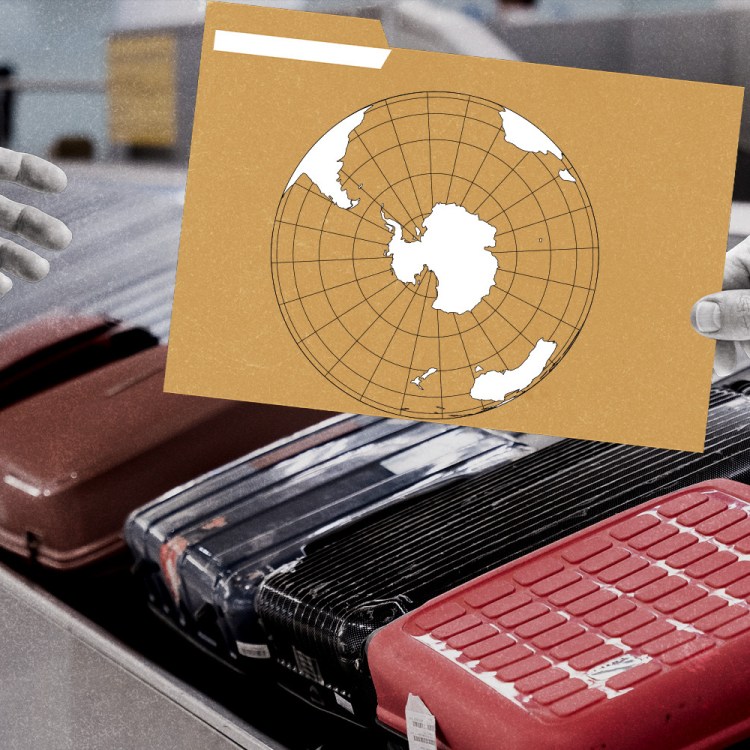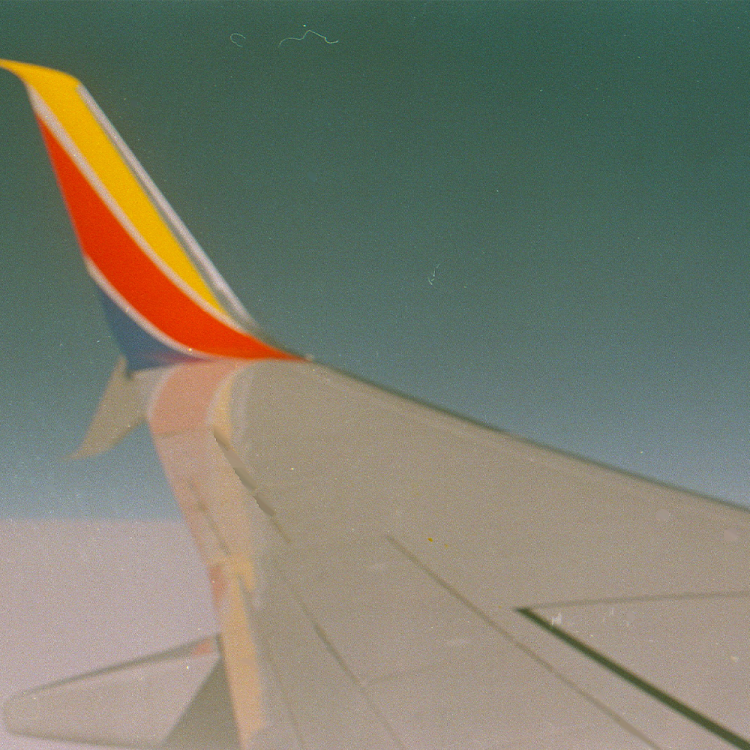Life moves fast during a pandemic. What was normal just one week ago feels years away from where we are now. While leisure travel is out of the question today, on Saturday, March 7, for many people, it still seemed perfectly OK. That’s the day Alex Robbins and Hans Nelson, two young Americans, flew from New York City to Rome on a long-awaited European vacation. What came next was, in their words, “the amazing race out of Europe.”
In an effort to bring you stories about the coronavirus around the globe, we got in touch with the 26-year-olds separately and spoke with them at length about their harrowing experience as they fled through Italy, France and Switzerland. The story below is told in their own words. It has been edited for length and clarity.
Before the Trip
Hans: My mom is retired now and she was going to spend two months in Italy. So she actually flew out there in January. We had known about this for a while, so I’ve been planning this trip since last year. She was going to have a flat, it was maybe five minutes from the Vatican. Eventually, I figured out that I could get Alex to go with me, and he wanted to go up to France, so we’re like, if we’re in France, we might as well go to Switzerland.
Alex: I did the same trip in 2012 — I did a Rome trip with my father in the summer and then a France trip with my mother. It was so incredible to see the contrast of the two. It’s truly insane, the difference in the lack of people, the lack of everything.
Hans: Obviously things started happening with the virus, but it hadn’t really been that bad in Italy yet. This is mid to late February, maybe two, three weeks before we go. I’m talking to my mom and she is concerned. She’s hearing the news, I’m telling her about people buying toilet paper here in the U.S. She’s like, “In Italy, people are concerned but it’s still OK. You can probably still come.” Because at that point, it was mainly up in the north.
March 7: From NYC to Rome
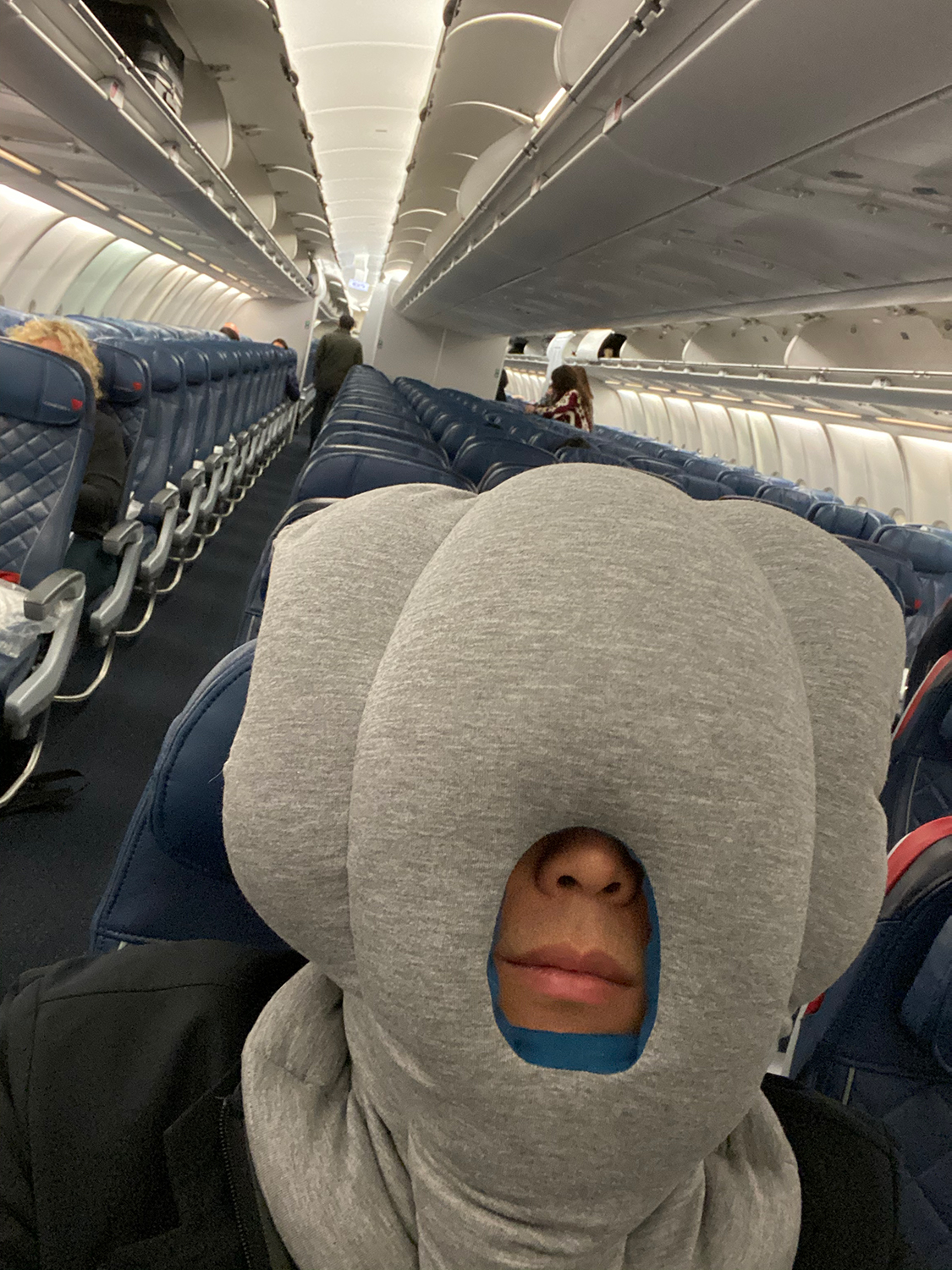
Hans: The flight is basically empty on the way there. On our whole flight, there are maybe 30 people on a 300-person flight. They don’t upgrade us to first class, which they totally should. We basically have one flight attendant per five people on the plane. So that’s ominous.
Alex: A cross-country flight not having any people is not normal. I’m sleeping horizontal the entire time and there isn’t a single person around me. It’s both eerie and convenient.
Hans: There’s a guy behind me and Alex, and he asks to be upgraded to first class. The flight attendant comes back — $7,000 for the upgrade. It was $3,000 in the app before, leading up to the flight. Then when I actually checked in, it was only $500 for the upgrade. So we start talking with him. He’s going back to Italy because he has dual citizenship, and he lives and works in America right now, but he’s going back because he wants to see his family. We ask, “Are you nervous or anything?” He’s like, “They live in the south, so I’m just going there and spending a couple weeks with them.”
March 8: First Day in Rome
Hans: We get to Italy, they take our temperatures at the airport, or at least they have us walk through thermal cameras. They let us in, and then we were in Rome.
Hans: An Italian guy picks us up, someone my mom had met. He is a 60-year-old Lebanese immigrant. The universities have been shut down, so his daughter is locked down. At that time, the lockdown is in effect in northern Italy, it just hasn’t been applied to the rest of the country. He isn’t too nervous, he’s kind of joking about it, like he doesn’t shake our hands at the airport and tells us to stand three feet away from him, but we shake hands after the drive and we get a cappuccino with him at a local cafe.
Alex: Being Asian, an Asian-faced person, is unfortunately impactful. I had experiences coming back to New York, too. In Italy, I’m walking down the street and someone actually crosses the street because they see me coming, and then crosses back over because they don’t want to be on the same side of the street. Throughout the eight days I begin to understand that it’s not in my control. I’ve always been the black sheep, so I’ve never been someone to be overly emotional about it, but I thought it was very much an overreaction to consider all Asian people a threat. And that is the trend in Rome when I’m there.
Hans: We just walk around a bunch, see the Vatican, see the sites. People are out and about.
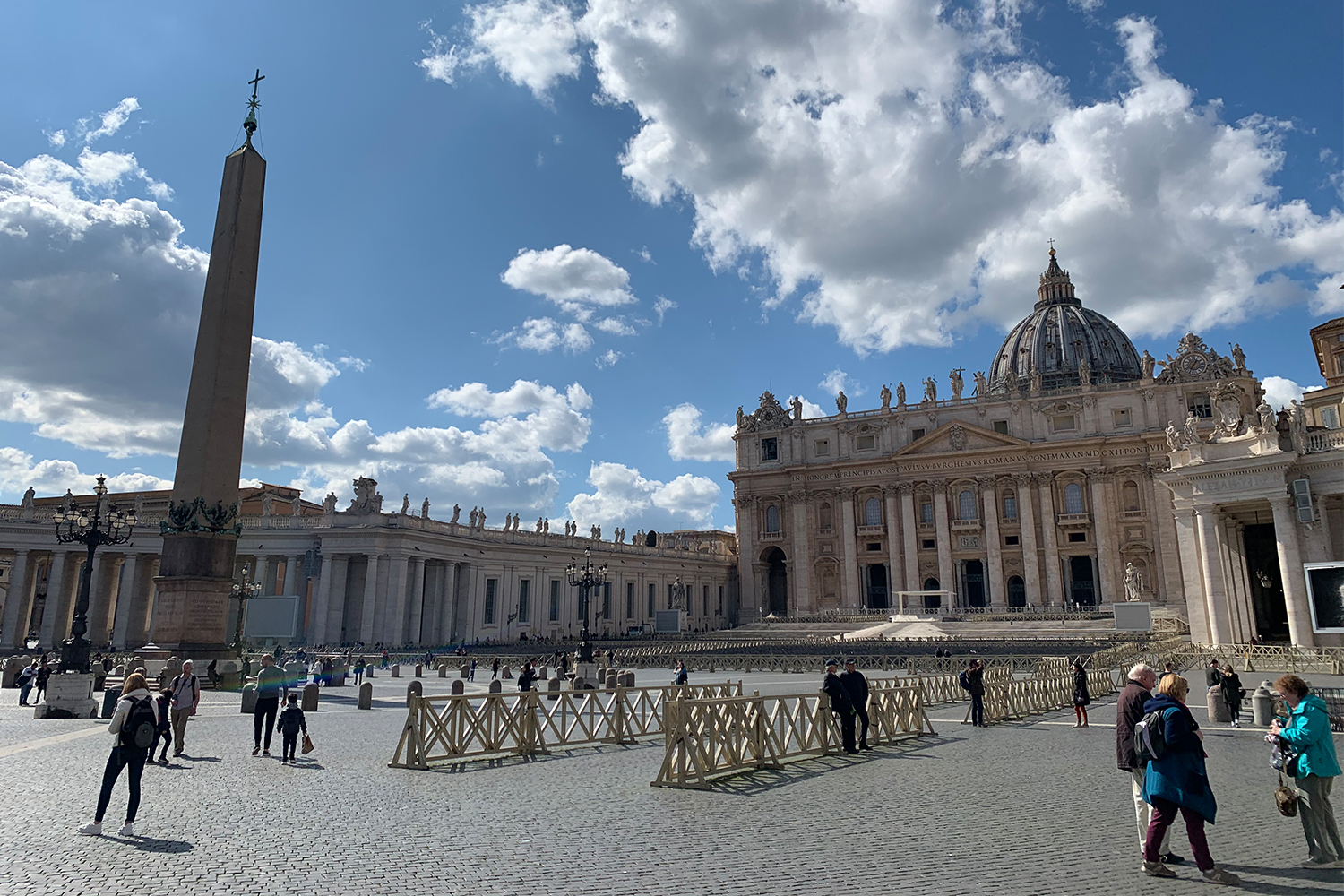
March 9: Second Day in Rome
Hans: We wake up the next day and they start to shut down the rest of Italy. They’re enforcing social distancing.
Alex: I’m sitting at a restaurant getting some work done in the window and then Hans and his mom arrive and sit down at the couple stools next to me. A waiter comes up immediately and says, “You guys have to separate because of the three-feet rule.” Or a meter. They’re taking it very strictly because the Italian government is enforcing fines, so the restaurants don’t want to have issues with the police. You talk to anyone that owns a business in Rome, they are struggling, truly struggling. And they are just happy to have people, whether it was an Asian person or not.
Hans: We are by the Colosseum and there is an NBC broadcast happening live. It’s set towards an American audience, so the reporter is standing up on a nice area where you can see the Colosseum behind him. It’s empty because they shut down the architectural and heritage sites. But as he’s talking about the pandemic, not even 10 feet away from him there’s a man on oxygen smoking a cigarette. The reporter is saying, “I can confirm to you now that there are riots in the prisons in Italy,” and we’re just watching this guy on oxygen smoking a cigarette, not having a care in the world.
March 10: Last Day in Italy, Drive to France
Hans: My mom leaves. She’s like, “I’m getting out of here. I don’t want to be here alone. If the shops close, if the restaurants close, then I’m kind of SOL, so I don’t want to be here.” She flies through Amsterdam back to Minneapolis. No screening at that point. They don’t ask her any questions or anything. She doesn’t even get asked if she had been in Italy at that point.
Alex: I previously decided that a car was much more easy to manage, and it actually ends up being perfect given the fact that the train stations are closing, having checks and whatnot.
Hans: There is no reason for us to be in Rome, so we’re like, let’s get the heck out of here. The guy at the car place is just coughing, we’re just like, shit, do we want to be near this guy? But we are showing up a day early because we had to get out. We have to pay for an upgrade. We ask if we could get a discount, but he says no.
Alex: There is zero traffic, zero police presence. I mean, I wasn’t going to speed the entire time, but there isn’t a single cop on the roads. My assumption is they’re all being utilized for reasons other than pulling people over. Still, our trip is a slog, it’s an eight-and-a-half-hour drive.
Hans: To get to France, the quickest way is to drive up through the center of Italy, which would take you close to Milan. Because we can’t do it, we have to drive up the coast. We don’t want to go through northern Italy at all. At this point, Italy has shut down all restaurants. The only thing open is supermarkets and pharmacies and they’re only letting in one person to the pharmacy at a time. As we’re driving, we see all the pharmacies which have these green LED crosses, but the gate is half closed on it and there’s a guard standing outside, and a line of people. It’s like that throughout the whole coast.
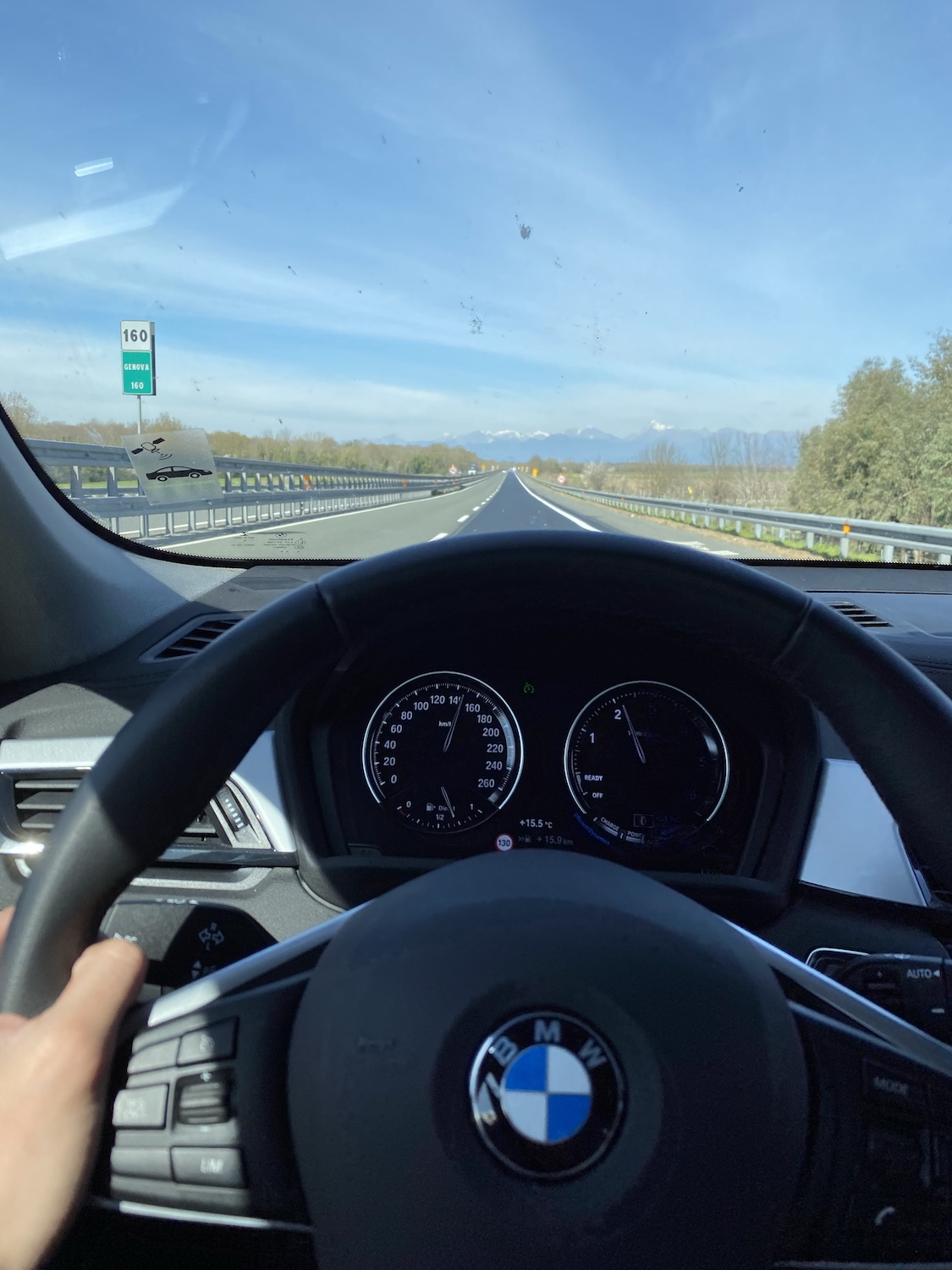
Hans: When we get to France, it’s eight o’clock at night and they’re like, “Bienvenue. Welcome to France.” They don’t ask us about where we’re coming from. We have an Italian license plate on our car and everything. No stop. They just shine a flashlight in the back of the car. They don’t even look at our passports.
March 11 and 12: Two Days in Èze, France
Hans: We’re in Èze, which is 15 minutes from Monaco, 20 minutes from Nice, down in the south, so still very close to Italy. France hasn’t shut down the borders, but they’re deciding what to do. We’re staying at this place called the Château de la Chèvre d’Or, The Golden Goat or something like that, and we’re talking with the director of the hotel. It’s a five-star hotel. There was a Michelin star restaurant there that we ate at. I guess Alex had been there before, and it’s the off-season, so we got a low rate. But there is nobody there.
Alex: It’s very peculiar that you’d be talking to the director in person — he’s the director of the entire hotel group and he’s chatting with us because we are the only two people in the bar. They don’t know what to do, they only opened 15 rooms instead of the 46 that they have, but then they end up getting a lot of bookings because people are escaping from Paris because Paris was shutting down. So we start to see, over the course of two days, people arriving.
Hans: We’re talking with these guys in the restaurant. One of them is from Jakarta and he is talking about how he has been at the receiving end of some racism in France for being an Asian person — that typical sad stuff you hear about. But he is asking us, “Is the virus real?” And we are like, “It definitely is.” But he is just incredulous. Then he says, “I went to Hong Kong, I went to Shenzhen in January.” Oh, that’s real, man. Then you should know.
Alex: The conversation we have with a waiter at one of the restaurants is interesting, Château Eza, the hotel that we did not stay at. They lost €40,000 euros in a day in cancellations. He’s sitting there with his hands on his head, “What do we do?” There’s nothing to be done. I mean, I order a thing of cream to my room and two people arrive at the door to deliver one jar of cream, because they literally just have nothing to do.
Hans: We’re hearing the news that France is shutting down their schools, so we’re like, let’s move on to the next place. We want to get away from Italy as much as possible. It’s Wednesday, and that’s the day Trump announces he is canceling European travel. But we see that Americans can still come back, so I call Delta. Delta says, “We’re not canceling any flights coming out of Europe.” I say, “I’m near Lyon, I’m near Marseille, I’m near Nice, I’m near Paris, I can drive to London. These are all places I can go to. I have my flight, which is out of Zurich, and it leaves next Saturday, what should I do?” And the guy is like, don’t go to Paris, go to Zurich, keep your same flight. So from the horse’s own mouth, I’m like, alright, I’m good.
Alex: We go to the Café de Paris in Monaco, which is like the most famous touristy restaurant. There are six waiters for our one table. They have French news on about the virus on one side and soccer playing on the other side. The waiters are just sitting there essentially doing nothing because we are the only table there. You’re talking about the most famous restaurant in Monaco.
March 13: Évian, France
Hans: Our next destination is Évian. We drive up through the French Alps. France is noticeably more populated. We drive through Nice, Grenoble. Absolutely stunning. It’s a beautiful drive.
Alex: We’re in a restaurant at the Hôtel Royal and there’s a guy at a table, there are only four tables, and he is coughing and definitely symptomatic, but neither hotel staff nor guests really care. I think a lot of the people decided that they wanted to enjoy their vacations or their time off as opposed to caring about something that may or may not affect them.
Hans: Évian’s a small resort town, not a place where you’d expect too many people, especially in the off-season. But what we had originally planned — there was going to be the Geneva Auto Show. There was this whole thing, you stay in Évian, they take you to the show in a nice car, but that was canceled. The guy at the hotel says they’re still at 40-percent capacity, but I think he’s lying.
Alex: Hans wakes up to a news notification, and I mean, I think he’s going to have a heart attack. He gets a notification about a border closure.
Hans: We’re still following along the headlines, of course. Switzerland has cases and I’m like, Switzerland might shut down their borders. But Évian is pretty close, it’s tucked in between Geneva and then Switzerland just wraps around that piece of France. I say, “Maybe we should get in there just to be safe.” So we spend one night in Evian, we leave the next day.
March 14: Switzerland, Interlaken to Zurich
Hans: We leave on Saturday and drive to Interlaken.
Alex: At the border, we don’t even stop to zero. When I crossed from Italy to France, and then when we cross from France to Switzerland, literally we don’t even hit zero kilometers per hour. It’s as lax as it could get. Being in France going into Switzerland, they should have obviously pulled us over and said, “Go back to Italy. What are you doing here?”
Hans: If I was Swiss, I would have been like, “Please let me see your papers real quick.” But no, they just waved us on through. That’s typical if you’re in the Schengen, but keep in mind, we’re driving in Europe and it’s me and Alex and we’re trying to figure it out with our Italian GPS. We’re turning down wrong streets, we’re interacting with cops and they’re just like, “What the fuck are you guys doing?” And we’re like, “We’re lost. We’re not from here. We’re Americans.” But none of them are ever like, “Where have you been?” None of that.
Alex: Switzerland is super weird because it’s as if they’re in their own little bubble. We arrive in Interlaken and there are tons of people. Tons. And Interlaken is a Chinese destination hub. It’s all these Asian people and we’re in a country of Europeans, and we think that people would be freaked out, but they’re not. So that gives you contrast between Italy and Switzerland and the way that they were looking at the Asian population. I was more happy to be in Switzerland than Italy, to tell you the truth.
Hans: We’re rushing because as we’re going through these countries, the borders are being basically shut behind us. We’re showing up a day early everywhere. I explain to the hotel in Interlaken, they say, “Don’t worry, we have rooms.” They check us in. We grab lunch and I connect to the wifi at the restaurant. I get an email from Delta: “Your flight’s been canceled.”
Hans: We have literally been in Interlaken for an hour, been in Switzerland for less than three hours. But we agree — let’s drive straight to Zurich. I walk straight back to the hotel desk, I go, “Hey man. I just checked in, I’m going to have to check out.” He says, “Oh. No problem.” They’ve been getting a lot of cancellations. This is just the story as we go along, it’s every place, all these resort towns are getting cancellations. They don’t charge me, I was only there for an hour, so good on them for that.
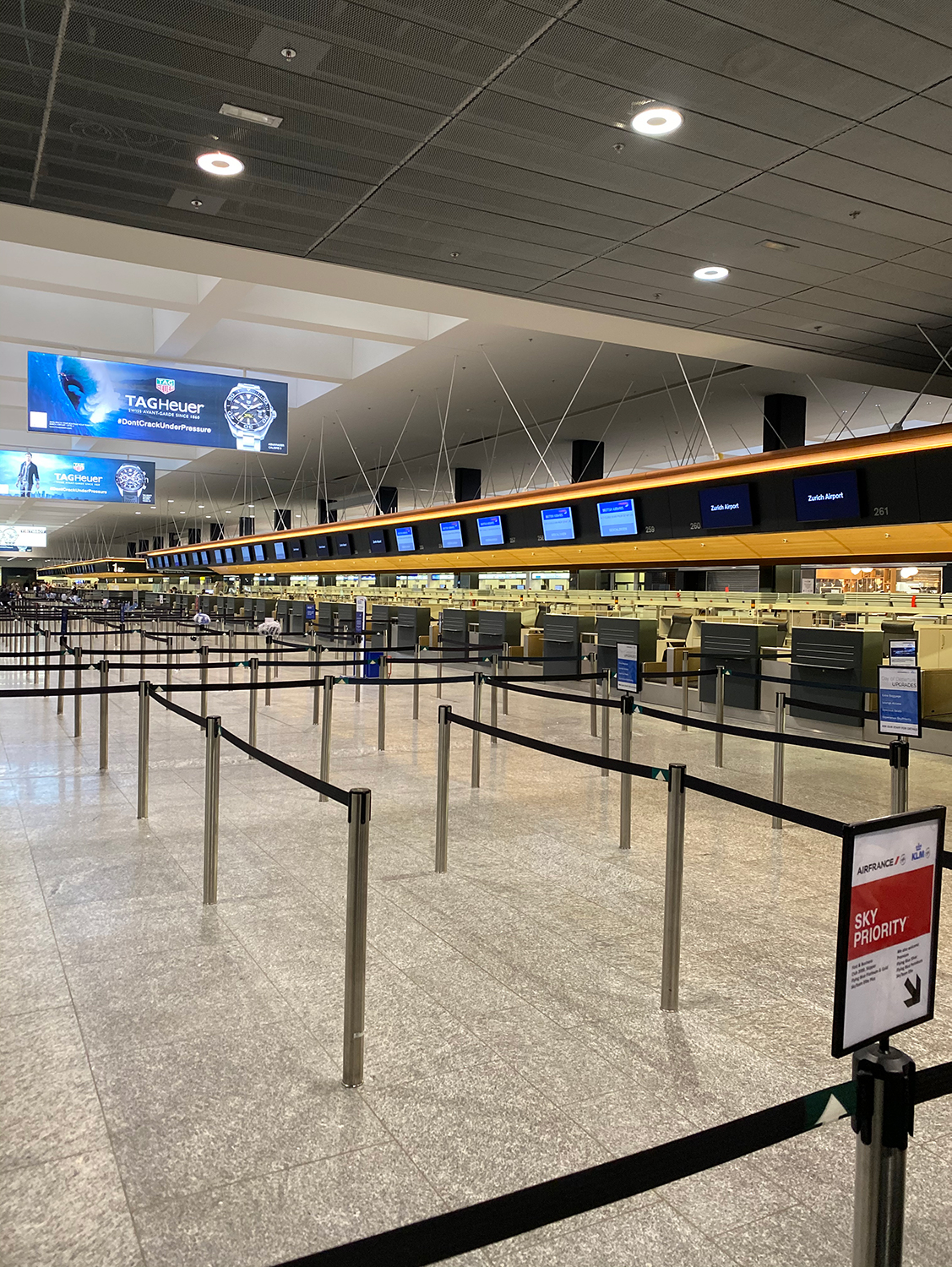
Hans: We drive straight from Interlaken to Zurich to get to the airport. I’m tired of calling Delta, we just want to talk with somebody. But we get there and it’s not a major Delta hub, and there aren’t any Air France or KLM people, any network people that can help us out. We’re just trying to figure out a game plan. I call Delta from the terminal, I spend an hour on hold with them. Meanwhile Alex is waiting in line with these people for KLM, but they can’t help us out. I eventually get on the phone with Delta and change our flights to leave the next day.
Alex: Zurich airport is empty. No one has their shit together. When we arrive to check in there are zero lines. Actually, at every transport hub, you see the news saying: panic, huge lines and people scrambling. But JFK leaving, FCO landing, Termini rail station in Rome, Zurich airport and JFK coming back were all empty. We had no problems.
Hans: What do we do until then? We stay at the Radisson Blu at the airport there and check in for one night. There are all these Russian dudes. There’s a bunch of skiers because Switzerland has closed all the ski hills and all the recreational areas.
Hans: When we drop off the car at the airport — we’re days early because we were planning to be in Europe another four or five days — we ask the Euro Car guy for some money back. He says he can’t help us, he only takes the car, but we think he’s lying because he sees our Italian license plate. As we’re walking away, he walks over with a bottle of disinfectant and just sprays it all over the car. He’s squirting it all over the dashboard, the seats, everything.
March 15: Back to the U.S.
Hans: Before we get on the plane in Switzerland, they give us this form. It’s the least official form you can imagine. The boxes aren’t even aligned on the page. It asks where you’ve been in Europe. Have you traveled to China, Iran or Italy? Yes or no. Then it asks you to self-report where you’re going to be staying in the U.S. — your home address or your hotel — and then your symptoms. Have you had any? Have you coughed? Have you had a fever? Again, totally self-reported. And then there’s a section at the bottom, where a CDC official is supposed to fill out their observations of you.
Hans: This flight is about 60 percent full on the way back. Definitely more full than our flight leaving. We’re flying back into JFK Airport and getting updates from the pilot. Basically the procedure is this: CDC and CBP are going to meet us at the gate. They’re going to have us deplane in small groups and we’re all going through a procedure with the forms they gave us.
Alex: The crew cannot stop reiterating the fact that they have no idea what’s going on. “This is information that we can tell you we have from the ground, given what we received from flight control. We don’t want to provide you with wrong information, so we will update you accordingly.” Literally nobody, when you ask a question about what to do or what’s going on, has any idea what the official procedure is in the U.S. or any of the three countries.
Hans: We pull up to the gate and they call us group by group. We grab our bags, get off and there are two people there totally masked up. They’ve got the aprons on and gloves and they take our temperature with a forehead reader. Then we walk down a hallway and hand our health form to another official. This little card is supposed to basically guarantee us entry. If we don’t have this card, then it would take another three hours for us to get screened again. On the flight, I actually lost my form, and I’m like, “Oh, shit.”
Alex: We fill out a questionnaire that Hans decides to lose, and it’s the one thing that we need to keep. But then we get to the airport and they literally are just throwing the sheets in a huge bin. It seems to just be a contact form so that if anyone tests positive they can maybe contact them, I’m assuming.
Hans: In the end, the official ends up giving me another form, no problem. But this thing is barely legible. It looks like it’s been copied and then copied again and then copied a third time and I’m getting that one. You can’t read it. The format of it is different than the one that I got in Switzerland. As I’m filling it out, one person in front of me says they have a cold and the person behind them says they have a fever. They are together, a boyfriend and girlfriend. The CDC guy just says, “Do you want to be checked?” They obviously don’t know what they have, but they both say yes.
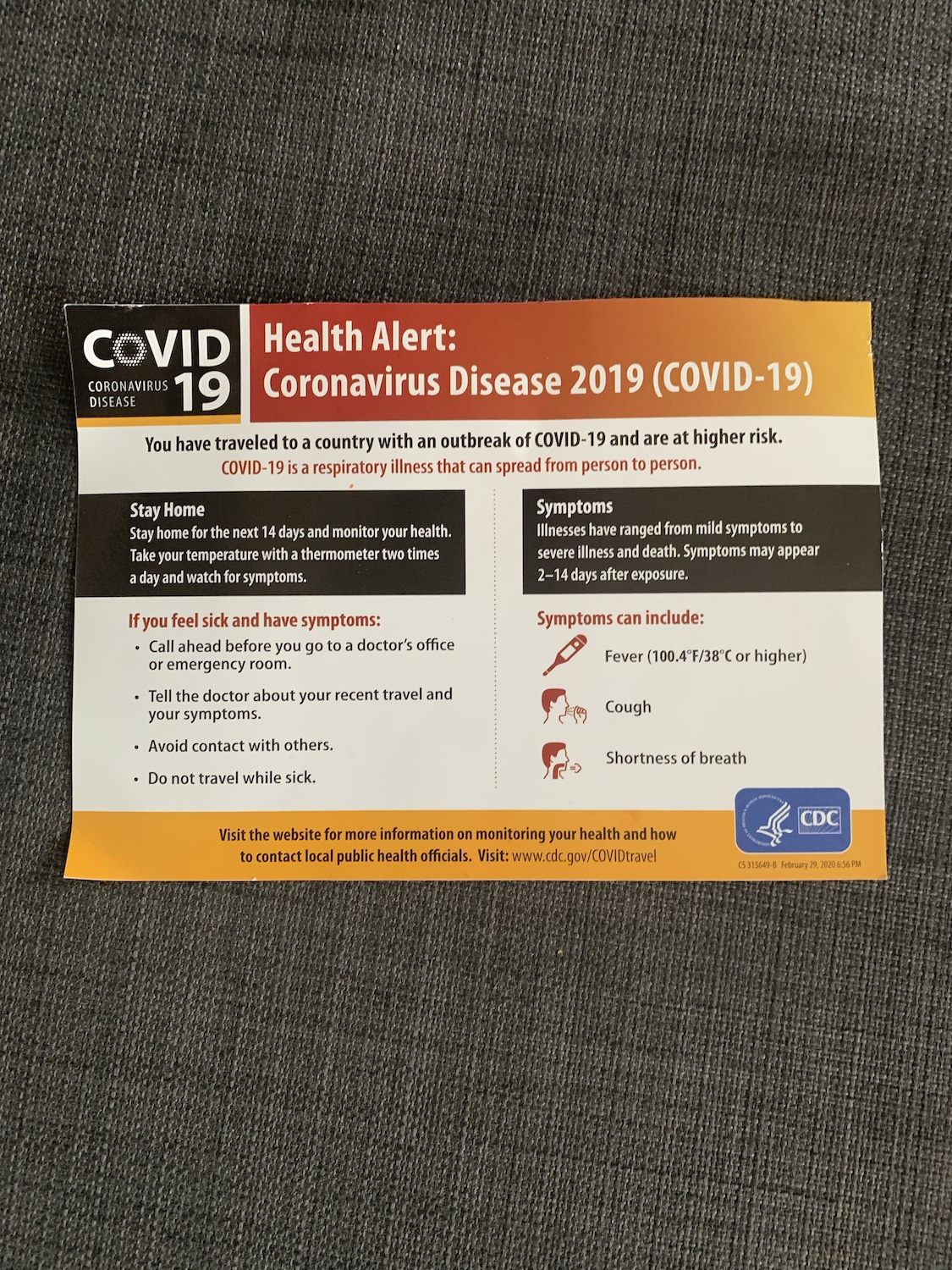
Alex: The temperature check takes no more than three seconds, which is really surprising to me. The U.S. seems to have zero protocol for entry.
Hans: When I hand in my form, the CDC guy says, “OK, you’ve been to Italy. Stay at home. Monitor your health for 14 days. Take your temperature twice a day.” There’s no more conversation. The whole process to enter the country takes about 40 minutes.
Alex: When I say that I’ve traveled to Italy, France and Switzerland, going through passport control, you know, he’s more concerned if I have any alcohol or any good merchandise that I purchased. Their script doesn’t change at all as far as your entry into the country. Very weird.
Hans: They don’t ask me anything about Italy. Obviously I’m a hot target because in my passport I have both Chinese visas and an Italy stamp. If you’re going to look at anybody’s passport a little bit more, it’d probably be mine. I haven’t been to China in two years, but if I was looking at my passport, I’d stop and pause and flip through every page. But none of that happens, they just hold it up, make sure that my photo is me and ask me if I bought any tobacco and let me into the country.
Hans: Coming back to New York, it’s equally as shut down as many places in Europe. But I’m in my apartment, I’m following the quarantine guidelines. I haven’t been out shopping or anything like that. So I’m taking it seriously. I don’t want people to get sick. I could be asymptomatic, I don’t know.
Alex: We’re very lucky because we got out just in time — the race, the amazing race out of Europe as all the countries tried to scramble to actually figure out what to do because no one was talking to anyone. I am now in Florida. My flight down had 142 seats open. It was not a thrill hunt, but it ended up being more of a cultural experiment. We got to see how the world works when it doesn’t work.
This article appeared in an InsideHook newsletter. Sign up for free to get more on travel, wellness, style, drinking, and culture.
